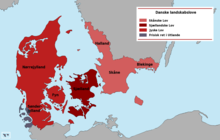
Back Jutland AF Chutlandia AN Ēotaland ANG يوتلاند Arabic يوتلاند ARZ Xutlandia AST Yutlandiya AZ Ютландия BA Ютландыя BE Ютляндыя BE-X-OLD


Jutland (Danish: Jylland [ˈjyˌlænˀ], Jyske Halvø or Cimbriske Halvø; German: Jütland, Kimbrische Halbinsel or Jütische Halbinsel) is a peninsula of Northern Europe that forms the continental portion of Denmark and part of northern Germany (Schleswig-Holstein). It stretches from the Grenen spit in the north to the confluence of the Elbe and the Sude in the southeast. The historic southern border river of Jutland as a cultural-geographical region, which historically also included Southern Schleswig, is the Eider. The peninsula, on the other hand, also comprises areas south of the Eider: Holstein, the former duchy of Lauenburg, and most of Hamburg and Lübeck.
Jutland's geography is flat, with comparatively steep hills in the east and a barely noticeable ridge running through the center. West Jutland is characterised by open lands, heaths, plains, and peat bogs, while East Jutland is more fertile with lakes and lush forests. The southwestern coast is characterised by the Wadden Sea, a large, unique international coastal region stretching through Denmark, Germany, and the Netherlands. The peninsula's longest river is the Eider, which rises close to the Baltic but flows in the direction of the North Sea due to a moraine, while the Gudenå is the longest river of Denmark. In order for ships not having to go around the whole peninsula to reach the Baltic, the Kiel Canal, the world's busiest artificial waterway, that crosses the peninsula in the south, has been constructed. Jutland is connected to Funen by the Old and New Little Belt Bridge, and Funen in turn is connected to Zealand and Copenhagen by the Great Belt Bridge.